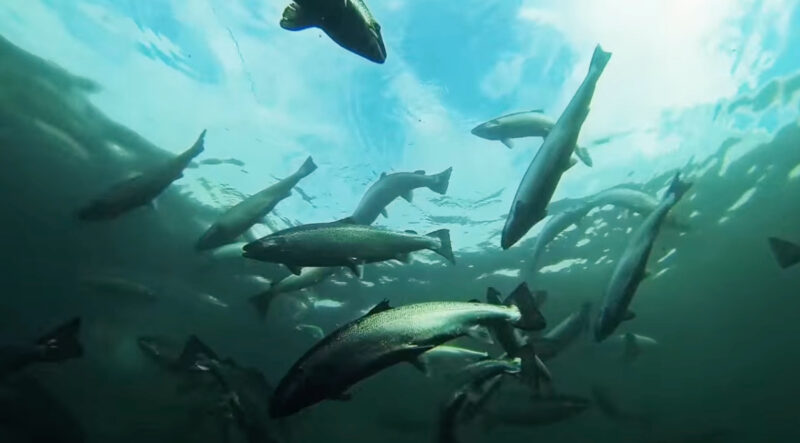“To preserve wild salmon, we must also grow salmon.”
Coalition of First Nations reaffirms right to farm salmon in their traditional territories.
By Fabian Dawson
SeaWestNews
Salmon farming First Nations are asking Indigenous leaders opposed to their marine aquaculture operations to meet with them as activists ratchet up their efforts to kill the sector in British Columbia.
Despite a wealth of scientific studies and court rulings that have concluded salmon farms have less than a minimal impact on wild stocks, the activists have influenced some indigenous leaders to oppose open-net aquaculture in the traditional territories of neighbouring nations.
This week, the activist group held a press conference in Vancouver to demand that Canada’s new Fisheries Minister Diane Lebouthillier remove open-net salmon farms in BC while the Federal Government works on a transition plan for the industry.
As usual the activist rhetoric was underlined by their central mantra that any government science, peer-reviewed studies and traditional knowledge challenging their claims should not be believed as it is influenced by salmon farmers.
The activists also made recent fake claims attempting to link this year’s high returns of adult pink salmon to the closure of some salmon farms – all of which have been thoroughly debunked, based on data collated by professional biologists and the Department of Fisheries and Oceans (DFO).
The Coalition of First Nations for Finfish Stewardship (FNFFS) in a statement said since time immemorial, Nations on the BC coast have respected the decision-making authority of their neighbouring Nations and trusted that they know what is best for their people.
“We are salmon people and have been for thousands of years: salmon fishers, salmon smokers, salmon guardians, salmon stewards and, for the past two decades, salmon farmers.
“Above all, we are environmentalists. We believe that to preserve wild salmon, we must also grow salmon, in a way that reflects our standards that surpass DFO regulations, and in a way that incorporates our traditional ecological knowledge, our marine management plans, and decades of documented Indigenous science.
“These are our waters, our livelihoods, our people, and our responsibility as ancient stewards to ensure any and all operations are done in our territories responsibly and under our oversight.
“We will not be the forced recipients of a colonial plan designed in urban centers, or hundreds and thousands of kilometers away, far from our coastal territories, far from our realities, and imposed by people who don’t walk in our shoes and who won’t feel the social impacts if that plan is a poor one,” said the Coalition.
“We respectfully reach out across the table and welcome those Nations …to sit down with us, Nation-to-Nation, and speak, listen, and learn together. After all, we are all salmon people.”
The BC Salmon Farmers Association (BCSFA) said contrary to what is being propagated by the activists there is no current government mandate to remove salmon farms from the ocean.
The most current language regarding the BC salmon farming Transition Plan is from the 2022 DFO Discussion Framework, which states, “The proposed vision of this open-net pen transition plan is to advance innovation and growth of sustainable aquaculture in British Columbia that progressively minimizes or eliminates interactions between open-net pens and wild salmon, while also taking into account social, cultural and economic objectives.”
Additionally, all farms operating in BC are currently done in agreement, negotiation, or established partnerships with First Nations in whose territories we operate.
“The sector respects the rights and title of First Nations to choose whether or not they have salmon farms in their territories. First Nations’ right to self-determination and reconciliation will lead to a successful transition plan, as outlined in our Transitions Principles.”
“Modern, sustainable, in-ocean salmon farming – led by coastal First Nations, backed by peer-reviewed science, and supported by our sector – provides a future for our rural, coastal and Indigenous communities,” said the BCSFA.
Farm-raised salmon is BC’s highest-valued seafood product and the province’s top agricultural export, generating over $1.2 billion for the provincial economy and creating thousands of jobs.
According to the United Nations FAO, wild-caught fish cannot meet demand as fish consumption is growing twice the global population growth rate.
“Given that aquaculture now supplies around 50 percent of aquatic food and given its potential to contribute to so many of the UN’s Sustainable Development Goals, we all need to focus on how to move it forward in a sustainable way,” said Xinhua Yuan, FAO’s Deputy Director for Aquaculture.
Image courtesy of BC Salmon Farmers Association

